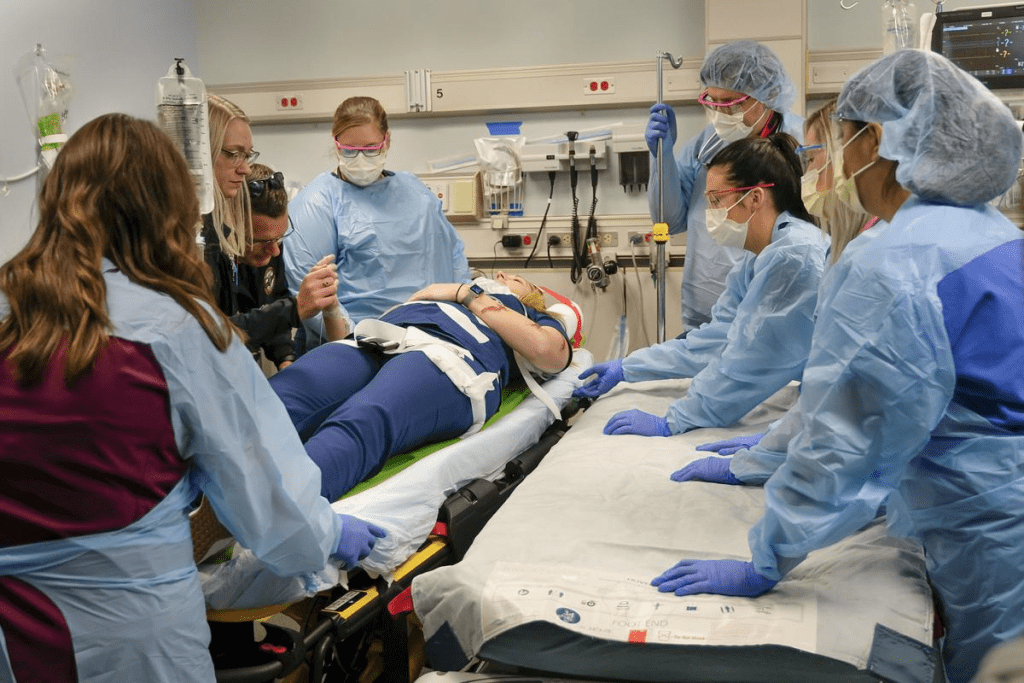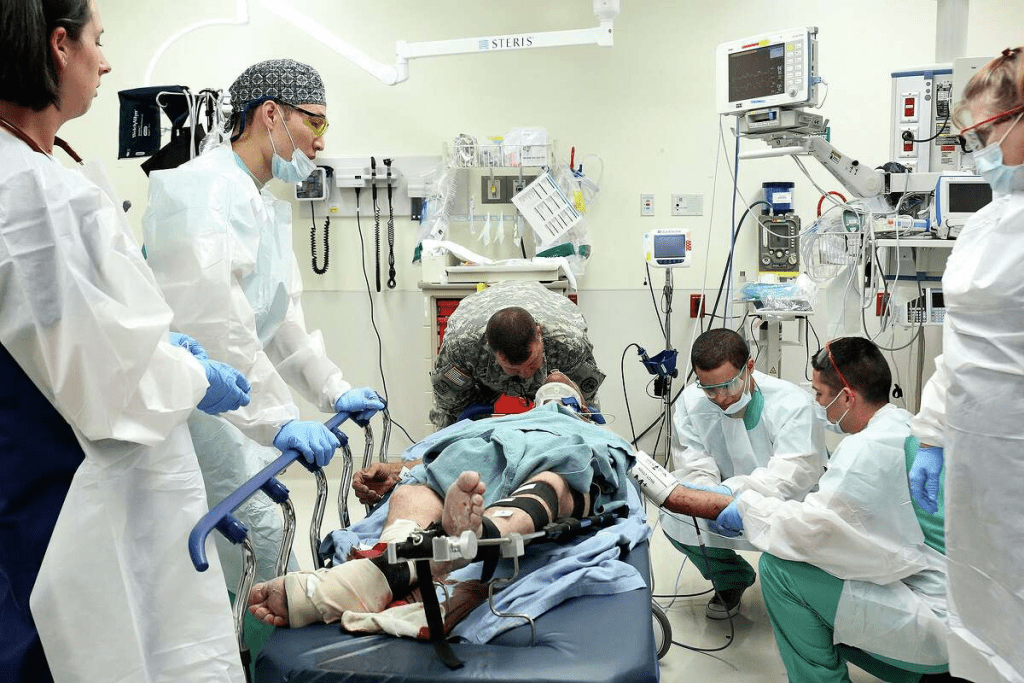Last Updated on October 21, 2025 by mcelik

Becoming a Pediatric Surgery Hard, trauma surgeon is a big challenge. It needs a strong educational base, hard work, and a love for helping patients. In the U.S., it usually takes 13 to 15 years after high school.
To become a traumatologist, you first need to finish your undergraduate studies. Then, you go to medical school for four years to get your medical degree.
After medical school, you start a surgical residency. This can last from five to seven years. Some might also do fellowship programs for more specialized training.

Getting to be a trauma surgeon takes a lot of time and effort. It’s a challenging path that prepares them for the tough job of surgical trauma care.
The first step is 4 years of undergraduate studies. Then, they spend 4 years in medical school. After that, they enter a surgical residency that lasts 4 to 7 years.
Lastly, they do a 1 to 2-year fellowship in trauma or surgical critical care. This whole journey takes 13 to 15 years after high school.
Trauma surgeons deal with serious injuries like blunt or penetrating trauma, burns, and critical care conditions. They need a lot of training to handle these complex cases.
Being a trauma surgeon means doing surgery, taking care of patients, and making quick decisions under pressure. Their long training helps them act fast and make the right choices in emergencies.

To become a trauma surgeon, you first need a bachelor’s degree from a recognized university. This step is key to a strong academic start and getting ready for medical school.
Most pre-med students pick science-based majors. This is because medical schools need students to have science credits before they start. Majors like biology, chemistry, and physics are common. They give a good base in the sciences.
“The best way to get ready for medical school is a strong science background,” said an expert in medical school admissions. “Students should really understand biology and chemistry.”
While getting your undergraduate degree, you need to take certain classes. These are needed to meet medical school requirements. Here are some:
Keeping a high GPA and doing well in science classes is very important. “A good academic record shows you can handle medical school’s tough environment.”
By choosing the right majors and classes, students can prepare well for their journey to become trauma surgeons.
Medical school is a four-year journey for students to learn trauma surgery skills. It’s a time of intense learning, mixing theory with practice. This foundation is key to a career in trauma surgery.
The first two years focus on classroom learning. Students dive deep into the human body, diseases, and treatments. Key subjects include anatomy, biochemistry, pharmacology, and physiology. These sciences are essential for understanding surgical procedures and patient care.
The final two years are for clinical rotations. Students get real-world experience in different medical fields. They work with patients and healthcare teams, using their knowledge in practice. Rotations in surgery and emergency medicine are key for trauma surgeons.
Students must prepare for the United States Medical Licensing Examination (USMLE) series. Passing the USMLE is vital for a medical license and residency programs. After medical school, they apply for residency to get specialized training.
Surgical residency is a key step to becoming a trauma surgeon. It provides hands-on training in many surgical areas. This time is vital for learning the practical skills needed to succeed.
A general surgery residency lasts 4 to 7 years. It aims to expose residents to various surgical fields. The program’s structure varies but includes rotations in different specialties.
This allows residents to understand surgical principles and practices broadly.
The general surgery residency structure has several phases. These include:
Residency programs offer trauma-focused training. Residents work with experienced trauma surgeons in trauma surgery rotations. This experience is key to developing the skills needed to handle trauma cases.
Some programs also provide fellowship opportunities in surgical critical care. This further enhances training in trauma and critical care.
The lifestyle during surgical residency is demanding. Residents work long hours, including nights and weekends. They may also be on call. Despite the challenges, this period is essential for building the stamina and expertise needed to succeed as a trauma surgeon.
Recent reforms aim to improve resident well-being. They regulate work hours and ensure residents have time for rest and education. Yet, the intensity of surgical residency remains a significant part of the training process.
Trauma surgeons need more training, which they get through fellowship programs in trauma surgery or surgical critical care. These programs are key to learning how to handle tough trauma cases.
A trauma surgery fellowship lasts one to two years. It gives surgeons advanced training in caring for very sick patients. These programs help surgeons learn how to manage complex trauma cases. Pediatric Surgery Hard.
These programs aim to expand knowledge in trauma surgery. They help surgeons keep up with new techniques and methods. By the end, surgeons will be experts in trauma care.
Board certification is a big step for trauma surgeons. First, they need to get certified in General Surgery from the American Board of Surgery. Getting certified in Surgical Critical Care is also a good idea.
The certification process is tough. It tests a surgeon’s knowledge, skills, and judgment. Getting certified shows a surgeon’s dedication to quality care and staying updated.
Becoming a skilled trauma surgeon takes a lot of time and effort. But it’s worth it to help patients in a big way.
Trauma surgeons are among the highest-paid doctors, with a median salary of $297,800 in 2021. This high pay shows their expertise, the tough work they do, and their key role in healthcare.
Trauma surgeons’ salaries vary based on their workplace, experience, and where they live. Here are some key factors that affect their pay:
The job market for surgeons, including trauma surgeons, is expected to grow 3% over the next ten years. This is slower than average, but there’s a steady need for skilled surgeons.
Several factors will shape the job market:
In summary, while the job growth rate is slower, the financial rewards and the importance of being a trauma surgeon make it a rewarding career for those ready for the challenge.
Becoming a trauma surgeon is a big challenge. It takes a lot of time, effort, and dedication. You need at least 13-15 years of education and training after high school.
This includes studying in college, medical school, and a residency program. You also need a fellowship program.
Trauma surgeons are key in healthcare, saving lives every day. They earn a median salary of $297,800. This shows how much skill and hard work this job requires.
There’s a good chance of finding a job in this field. It’s a great career for those who love helping others and want to make a difference.
The long education and training make sure trauma surgeons are ready for tough cases. For those who want to help others, this career is very rewarding.
To become a trauma surgeon, you first need to finish your undergraduate studies. Then, you must attend medical school. After that, you’ll complete a surgical residency and a fellowship in trauma surgery. This journey takes about 13-15 years after high school.
Aspiring trauma surgeons should major in biology, chemistry, or physics. These sciences are key to preparing for a federal school.
Surgical residencies last from 4 to 7 years. They offer hands-on training in various surgical fields.
Trauma surgeons perform surgeries and give critical care. They make quick decisions to save critically ill patients.
To become certified, you need to finish a trauma surgery fellowship. Then, pass a certification exam to show your expertise and commitment to quality care.
Trauma surgeons earn a median salary of about $297,800. Salaries vary based on location, experience, and employer.
Fellowship programs in trauma surgery offer advanced training. They prepare surgeons for the challenges of caring for critically ill patients.
Becoming a trauma surgeon takes at least 13-15 years after high school. This includes undergraduate studies, medical school, residency, and fellowship.
The job market for trauma surgeons is promising. There’s a growing need for skilled and dedicated professionals in this field.
General surgeons do many surgeries, including emergency ones. They also provide critical care. Some may get extra training in trauma surgery.
Emergency medicine doctors usually don’t do surgeries. They might do minor procedures. Major surgeries, like trauma surgeries, are done by surgeons, including trauma and general surgeons.
Subscribe to our e-newsletter to stay informed about the latest innovations in the world of health and exclusive offers!